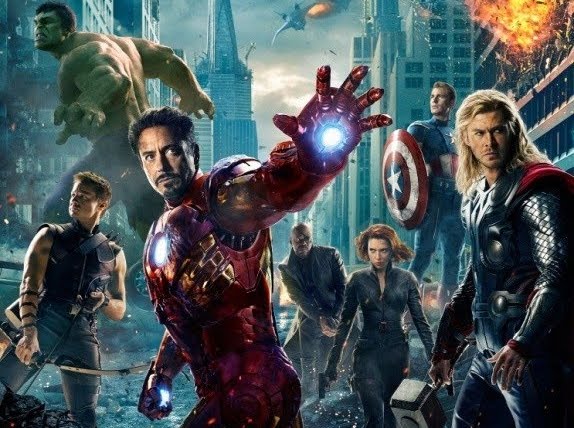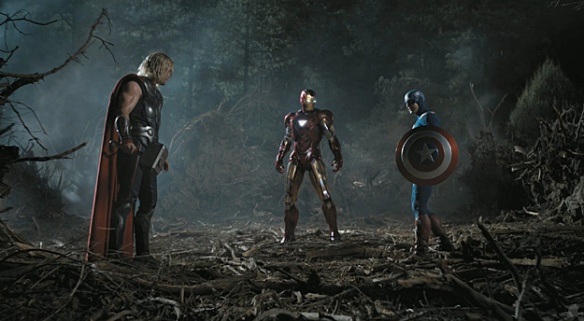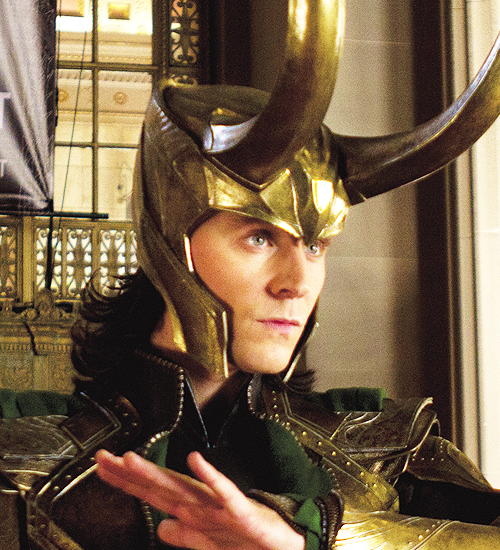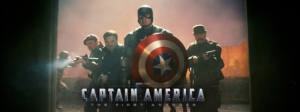The Avengers was definitely the biggest movie in the summer of 2012. It Hulk-smashed all kinds of records with the money that it made. Its success is due in part to the fact that it appeals to all ages and easily lends itself to repeat viewings, because it’s just plain fun.
It’s difficult to do an analysis on the “message” of this movie, in part because as a whole, it’s kinda disorganized. Plot lines are a little scattered, and not many characters are allowed enough screentime to develop or have significant arcs. Director Joss Whedon himself said:
“The Avengers” is notably IMperfect, which makes its success mean so much more to me — because it’s striking a chord that matters MORE than its obvious flaws. Like the team, it appears to be more than the sun [sic] of its parts. –source
I guess the overall message must be about teamwork, because the Avengers have to work together in order to defeat the invading alien army. It takes them the better part of the film to get on the same page and iron out their individual issues, but in the final battle they form a single, super-powered unit. Though not a particularly new or surprising message, it is a Biblical one.
Two are better than one, because they have a good return for their labor: If either of them falls down, one can help the other up. But pity anyone who falls and has no one to help them up…Though one may be overpowered, two can defend themselves. A cord of three strands is not quickly broken. –Ecclesiastes 4:9-10,12
The world of this movie presupposes the existence of super-beings and portals to alien worlds, but that’s standard fare in comic-based stories, and it’s not like the Bible doesn’t have its share of super-humans. (Samson, Goliath). Thor and Loki are referred to as “gods” but it’s been established that they are really just from another planet, so they appear to be more than human, but in this film Hulk demonstrates that Loki is a “puny god” and Captain America responds to Black Widow’s assessment of Thor and Loki as deities with “There’s only one God, ma’am, and I’m pretty sure he doesn’t dress like that.” In other words, I don’t have a theological problem with the premise of this story.
Even the title, “The Avengers,” isn’t really a problem for me, although we’re told in scripture that the revenge isn’t something we should pursue:
Do not repay anyone evil for evil. Be careful to do what is right in the eyes of everybody. If it is possible, as far as it depends on you, live at peace with everyone. Do not take revenge, my friends, but leave room for God’s wrath, for it is written: “It is mine to avenge; I will repay,” says the Lord. –Romans 12:17-19
For one thing, an epic fight to save the entire human race from enslavement is a little different than avenging a personal wrong, and Loki and his army are not making it possible for the heroes to “live at peace” with them. The Avengers might use the death of someone close to them as a unifying motivator to join forces against the invaders, but you have to admit that’s what they would have ended up doing anyway. That motivation was partially included so they could allude to the title. And finally, “avenging” the earth is not really what this team of superheroes does, it’s saving the earth and everybody in it just like every other superhero movie. But when they wrote these comics, they didn’t want to call it “Team of Superheroes,” and “Justice League” was taken. In other words, I don’t have a problem with the title of this movie despite its connotations.
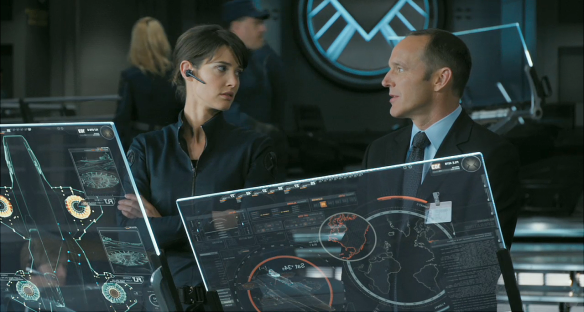
The superheroes are not the only heroes in this film. Many “ordinary” humans, such as S.H.I.E.L.D agents Maria Hill and Phil Coulson, are equally brave and self-sacrificing.
There is a moment when Loki overpowers a crowd of terrified civilians and commands them to show him deference:
“Kneel before me. I said… KNEEL! Is not this simpler? Is this not your natural state? It’s the unspoken truth of humanity that you crave subjugation. The bright lure of freedom diminishes your life’s joy in a mad scramble for power. For identity. You were made to be ruled. In the end, you will always kneel.”
Well, Loki is the villain, so of course we’re not meant to agree with what he says, but I just wanted to take it apart and compare it to what scripture actually says rather than writing the whole thing off as bad-guy-blather. First, I do not think that God agrees that it’s better for humans to be in subjugation, but there might be some truth to the claim that humans crave it. Sometimes. If you look at 1 Samuel 8, God’s prophet warns the people what having a king will mean, in detail. He outlines, at God’s command, all the ways that they will be oppressed if they choose to follow a human leader instead of their Godly one, but the people insist. It’s a very interesting passage, but I’m referring to it because it’s clear that God’s ideal society does not involve the kind of subjugation that Loki is talking about.
God does, however, perhaps agree with the statement that in the end, humans will kneel. Because he has said:
Before me every knee will bow; by me every tongue will swear. –Isaiah 45:23
It’s different from saying that humans are destined to be “ruled” in the sense that Loki is invoking, but it is true that our Creator made us to worship him and be ruled by him. (Why do you think Jesus refers to the Kingdom of Heaven so much? Who’s the King of that Kingdom?) Anyway, the final point I wanted to make on Loki’s speech is that God’s intentions for humanity do not involve the squashing out of individual identity. Just look at the passage in 1 Corinthians 12 on the diversity of spiritual gifts, and how one is not greater than the other, and all are essential.
I guess there are a lot of little micro-messages you might be able to take away from little moments in this movie; not really messages, but things you could use in a sermon or lesson illustration. For example, if I were teaching teenagers on Jacob and Esau, I might say that they were a bit like Thor and Loki in The Avengers, in the sense that they are estranged brothers, because that motif seems to have really moved people. I might reference Loki’s manipulation of Hawkeye to explain demon-possession. I might reference Black Widow’s insistence that she’s only helping the team because she’s “got red in [her] ledger,” when talking about the futility of trying to save oneself by works alone. I wouldn’t really use Iron Man’s allusion to the story of Jonah, since Biblical Jonah did not set off explosives inside the belly of the big fish, and movie-Iron Man did not spend any time in repentant prayer, so they really have nothing in common. (But props to the movie for the Biblical shout-out. And to computer-Jarvis for accurately assessing “I wouldn’t consider him a role model.” I mean, Jonah’s story begins and ends with him kind of being bitter and wimpy.)
In conclusion, I would totally recommend this movie, to everyone, because it is, as I can’t emphasize enough, just plain fun. And it’s the most fun if you’ve seen all the other Marvel movies, too. (Iron Man I, Iron Man II, Thor, Captain America: The First Avenger). I am greatly anticipating the next several films that Marvel is developing, and I hope that I will be able to endorse them as well.

